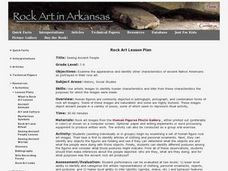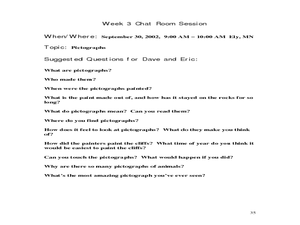PBS
Native American Pictographs
Scholars use a variety of common Native American pictographs to write a sentence. Through a series of pictures, readers decipher what the author has written. Colored pencils bring color to the assignment.
Curated OER
Creating Stories Using Pictographs
Fourth graders research pictograph stories written by Native Americans. They investigate the history behind pictographs, and look through a reference book identifying the different pictures. The teacher then create their own individual...
Curated OER
Plains Indians Pictographs
Students explore methods of written communication. In this Plains Indian lesson, students create pictographs representing everyday modern life after observing the pictographs used by the Plains Indians. Pictograph stories are written on...
National Museum of the American Indian
Lone Dog's Winter Count: Keeping History Alive
What is oral tradition, and what unique tool did the Native Americans of the Northern Great Plains use to help them remember their complex histories? Through pictograph analysis, discussion, research, and an engaging hands-on activity,...
Curated OER
Creating Stories Using Pictographs
Students participate in diverse cultural activities that lead them to a better understanding of Native American people. They use pictographs to write a story, imagining themselves as tribal members. Students transfer their story to a...
Curated OER
Virtual Winter Count
Learn more about the North American Plains Indian tribes and their unusual methods of recording historical events. Learners examine the winter count, a custom by which these groups illustrated information after each winter passed. They...
Curated OER
Native Lands: Indians in Georgia, How Do We Know What We Know?
Pupils examine Native American oral traditions. In this Georgia history lesson plan, students discuss Native American oral traditions and research stories of migration. Pupils create their own oral history projects that feature their...
Sargent Art
Rainsticks
This rainstick lesson isn't just about making art; it's about understanding Native American symbols and culture. Kids read about the use of rainsticks and why specific symbols were used to decorate them. They then make their own...
Curated OER
Pictograph Stone Carving
Students examine pictures of pictograph writing by Native American tribes, and discuss why this method of communication was used. They create their own messages with symbols and drawings on pieces of Styrofoam to simulate rock carvings.
Curated OER
Rock Art Stencil Printing
Students will create a painting using symbols that were used by Native Americans or symbols they create based on what they have learned about symbols used in Native American rock paintings.
Curated OER
Talking Rocks
Third graders explain the difference between Petroglyphs and Pictographs from Ancient Native American peoples. They create symbols that are representative of a story about their world.
Curated OER
Indians in Georgia: How Do We Know What We Know?
Learners discover archaeology by investigating the history of Native Americans in Georgia. In this U.S. history lesson, students participate in a mock archaeological excavation in their classroom by recovering artifacts and drawings...
Curated OER
Talking Rocks
Third graders consider the differences between pictographs and petroglyphs. They create symbols from a story about their worlds. They make pottery art.
Curated OER
Rock Speaks
Students create primitive forms and caricatures to represent meaningful figures and/or events in their own lives, present their own works to the class, and attempt to interpret the relevant meaning from other students' work.
Curated OER
Picture Writing
Fourth graders create symbols. In this visual arts lesson, 4th graders study cave drawings, Native American pictographs, and Aboriginal Drawings prior to creating their own communication without using words.
Curated OER
Worth a Thousand Words
First graders examine the significance of the American bison to the American Indians of the Great Plains. They create a story in pictographs in the style of American Indians of the Plains.
Curated OER
Native American Homelands
Students discuss the Navajo, Sioux, and Iroquois tribes, noting their distinctive characteristics. They trace the homeland of each of the tribes on maps and create map keys. Students explain how they developed their map keys.
Curated OER
Social Studies: People in the Rocks
Students discover characteristics of Native Americans as depicted in their rock art. By examining the rocks from the Human Figures Photo Gallery, they make inferences about the activities and purposes of the people drawn on them.
Curated OER
Pages Out of the Past
Students examine examples of rock art and the reasons why they were made. They translate the images into a creative writing piece that be attached to their own rock art.
Curated OER
Rockin? Chalk (Integrating science - make own chalk)
Students use plaster of Paris, talc, and cornstarch to create their own chalk. They hypothesize what mixture of ingredients produce the "best" chalk. Students discuss what they think are the characteristics of the "best" chalk.
Curated OER
Buffalo Hide
Students study about the Native American practice of writing stories on buffalo skins. They study about pictographs and use symbols to write their own stories using "buffalo hides" they have created.
Curated OER
Art and Culture
Students compare and contrast the ways in which human figures are portrayed in rock art made by ancient Native American artists and in the drawings and paintings of historic European and American artists. They use images to identify...
Curated OER
Ojibwa Arts
Students create a poem based on the Native American Ojibwa art that they read about. In this Ojibwa art lesson plan, students read captions and look at pictures of Ojibwa art and then make up a poem based on them.
Curated OER
Pictograph Robe Stories
Fourth graders explore the diversity and commonality of human interdependence. Also, the global cooperation of the people of the United States and the world through a multicultural and historical perspective. They describe the...

























